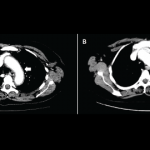 Dana Direnzo, MD, is a fellow in the Division of Rheumatology at Johns Hopkins School of Medicine in Baltimore.
Dana Direnzo, MD, is a fellow in the Division of Rheumatology at Johns Hopkins School of Medicine in Baltimore.
 Ami Shah, MD, MHS, is an associate professor of medicine in Division of Rheumatology at Johns Hopkins School of Medicine in Baltimore. A primary research interest for Dr. Shah is the relationship between autoimmune disease and cancer, with a focus on scleroderma.
Ami Shah, MD, MHS, is an associate professor of medicine in Division of Rheumatology at Johns Hopkins School of Medicine in Baltimore. A primary research interest for Dr. Shah is the relationship between autoimmune disease and cancer, with a focus on scleroderma.
 Clifton O. Bingham III, MD, is a professor of medicine in the Division of Rheumatology at Johns Hopkins School of Medicine in Baltimore. He has an extensive background in patient-centered research, clinical trials and translational research in rheumatoid arthritis.
Clifton O. Bingham III, MD, is a professor of medicine in the Division of Rheumatology at Johns Hopkins School of Medicine in Baltimore. He has an extensive background in patient-centered research, clinical trials and translational research in rheumatoid arthritis.
 Laura C. Cappelli, MD, MHS, is an instructor of medicine in the Division of Rheumatology at Johns Hopkins School of Medicine in Baltimore. One of her main clinical and research interests is evaluation and management of rheumatic immune-related adverse events.
Laura C. Cappelli, MD, MHS, is an instructor of medicine in the Division of Rheumatology at Johns Hopkins School of Medicine in Baltimore. One of her main clinical and research interests is evaluation and management of rheumatic immune-related adverse events.
References
- Couzin-Frankel J. Cancer Immunotherapy. Science. 2013 Dec 20;342(6165):1432–1433. doi:10.1126/science.342.6165.1432.
- Coley WB. The treatment of malignant tumors by repeated inoculations of erysipelas. With a report of ten original cases. 1893. Clin Orthop Relat Res. 1991 Jan;(262):3–11.
- Hodi FS, O’Day JS, McDermott DF, et al. Improved survival with ipilimumab in patients with metastatic melanoma. New Engl J Med. 2010 Aug 19;363(8):711–723.
- Abdel-Wahab N, Shah M, Suarez-Almazor ME. Adverse Events Associated with Immune Checkpoint Blockade in Patients with Cancer: A Systematic Review of Case Reports. Nishikawa H, ed. PLoS One. 2016 Jul 29;11(7):e0160221.
- Azoury SC, Straughan DM, Shukla V. Immune checkpoint inhibitors for cancer therapy: Clinical efficacy and safety. Curr Cancer Drug Targets. 2015;15(6):452–462.
- Topalian SL, Drake CG, Pardoll DM. Immune checkpoint blockade: A common denominator approach to cancer therapy. Cancer Cell. 2015;27(4):450–461.
- La-Beck NM, Jean GW, Huynh C, et al. Immune checkpoint inhibitors: New insights and current place in cancer therapy. Pharmacotherapy. 2015 Oct;35(10):963–976.
- Inman BA, Longo TA, Ramalingam S, Harrison MR. Atezolizumab: A PD-L1 blocking antibody for bladder cancer. Clin Cancer Res. 2016 Nov 30. doi: 10.1158/1078-0432.CCR-16-1417.
- Michot JM, Bigenwald C, Champiat S, et al. Immune-related adverse events with immune checkpoint blockade: A comprehensive review. Eur J Cancer. 2016;54:139–148.
- Johnson DB, Balko JM, Compton ML, et al. Fulminant myocarditis with combination immune checkpoint blockade. N Engl J Med. 2016 Nov 3;375(18):1749–1755.
- Weber JS, Postow M, Lao CD, Schadendorf D. Management of adverse events following treatment with anti-programmed death-1 agents. Oncologist. 2016 Oct;21(10):1230–1240.
- Postow MA, Chesney J, Pavlick AC, et al. Nivolumab and ipilimumab versus ipilimumab in untreated melanoma. N Engl J Med. 2015 May 21;372(21):2006–2017.
- Hodi FS, Chesney J, Pavlick AC, et al. Combined nivolumab and ipilimumab versus ipilimumab alone in patients with advanced melanoma: 2-year overall survival outcomes in a multicentre, randomised, controlled, phase 2 trial. Lancet Oncol. 2016 Nov;17(11):1558–1568.
- Cappelli LC, Shah AA, Bingham CO. Cancer immunotherapy-induced rheumatic diseases emerge as new clinical entities. RMD Open. 2016 Sep 28;2(2):e000321.
- Cappelli LC, Gutierrez AK, Baer AN, et al. Inflammatory arthritis and sicca syndrome induced by nivolumab and ipilimumab. Ann Rheum Dis. 2017 Jan;76(1):43–50.
- Fadel F, El Karoui K, Knebelmann B. Anti-CTLA4 antibody-induced lupus nephritis. N Engl J Med. 2009;361(2):211–212.
- Goldstein BL, Gedmintas L, Todd DJ. Drug-associated polymyalgia rheumatica/giant cell arteritis occurring in two patients after treatment with ipilimumab, an antagonist of CTLA-4. Arthritis Rheumatol. 2014 Mar;66(3):768–769.
- Sheik Ali S, Goddard AL, Luke JJ, et al. Drug-associated dermatomyositis following ipilimumab therapy: A novel immune-mediated adverse event associated with cytotoxic T-lymphocyte antigen 4 blockade. JAMA Dermatol. 2015 Feb;151(2):195–199.
- Minkis K, Garden BC, Wu S, et al. The risk of rash associated with ipilimumab in patients with cancer: A systematic review of the literature and meta-analysis. J Am Acad Dermatol. 2013 Sep;69(3):e121–e128.
- Bourke JM, O’Sullivan M, Khattak MA. Management of adverse events related to new cancer immunotherapy (immune checkpoint inhibitors). Med J Aust. 2016 Nov 7;205(9):418–424.
- Food and Drug Administration. Approved risk evaluation and mitigation strategy (REMS).
- Stone JB, DeAngelis LM. Cancer-treatment-induced neurotoxicity—focus on newer treatments. Nat Rev Clin Oncol. 2016 Feb;13(2):92–105.
- Tabchi S, Messier C, Blais N. Immune-mediated respiratory adverse events of checkpoint inhibitors. Curr Opin Oncol. 2016 Jul;28(4):269–277.
- Woodworth T, Furst DE, Alten R, et al. Standardizing assessment and reporting of adverse effects in rheumatology clinical trials II: The Rheumatology Common Toxicity Criteria v.2.0. J Rheumatol. 2007 Jun;34(6):1401–1414.
- Cappelli LC, Shah AA, Bingham CO 3rd. Immune-related adverse effects of cancer immunotherapy—Implications for rheumatology. Rheum Dis Clin North Am. 2017 Feb;43(1):65–78.
- Cheng R, Cooper A, Kench J, et al. Ipilimumab-induced toxicities and the gastroenterologist. J Gastroenterol Hepatol. 2015 Apr;30(4):657–666.
- Mercer LK, Askling J, Raaschou P, et al. Risk of invasive melanoma in patients with rheumatoid arthritis treated with biologics: Results from a collaborative project of 11 European biologic registers. Ann Rheum Dis. 2017 Feb;76(2):386–391.
- Mercer LK, Galloway JB, Lunt M, et al. Risk of lymphoma in patients exposed to antitumour necrosis factor therapy: Results from the British Society for Rheumatology Biologics Register for Rheumatoid Arthritis. Ann Rheum Dis. 2017 Mar;76(3):497–503.
- Menzies AM, Johnson DB, Ramanujam S, et al. Anti-PD-1 therapy in patients with advanced melanoma and preexisting autoimmune disorders or major toxicity with ipilimumab. Ann Oncol. 2016 Sep 29. pii: mdw443.
- Johnson DB, Sullivan RJ, Ott PA, et al. Ipilimumab therapy in patients with advanced melanoma and preexisting autoimmune disorders. JAMA Oncol. 2016 Feb;2(2):234–240.



